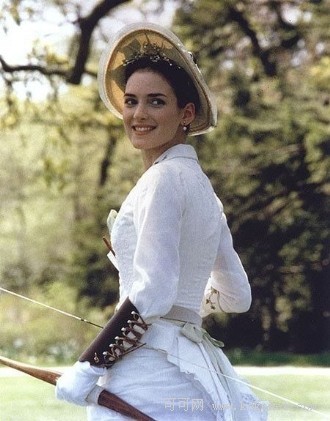
The next day he persuaded May to escape for a walk in the Park after luncheon. As was the custom in old-fashioned Episcopalian New York, she usually accompanied her parents to church on Sunday afternoons; but Mrs. Welland condoned her truancy, having that very morning won her over to the necessity of a long engagement, with time to prepare a hand-embroidered trousseau containing the proper number of dozens.
第二天,他說(shuō)服梅脫出身來(lái),午飯后到公園去散步。按照紐約圣公會(huì)教徒的老習(xí)慣,她在星期天下午一般是要陪父母去教堂的。不過(guò)就在上午,韋蘭太太剛剛說(shuō)通她同意將訂婚期延長(zhǎng),以便有時(shí)間準(zhǔn)備足夠的手工刺繡作嫁妝,所以就寬容了她的偷懶。
The day was delectable. The bare vaulting of trees along the Mall was ceiled with lapis lazuli, and arched above snow that shone like splintered crystals. It was the weather to call out May's radiance, and she burned like a young maple in the frost. Archer was proud of the glances turned on her, and the simple joy of possessorship cleared away his underlying perplexities.
天氣十分信人。碧藍(lán)的天空襯托著林陰大道上那些樹(shù)木光禿禿的圓頂,樹(shù)頂下面的殘雪像無(wú)數(shù)水晶碎片熠熠閃光。這天氣使得梅容光煥發(fā),像霜雪中的一棵小楓樹(shù)那樣光彩奪目。阿切爾為路人投向她的目光而感到自豪,占有者率直的幸福感清除了他內(nèi)心深處的煩惱。
"It's so delicious--waking every morning to smell lilies-of-the-valley in one's room!" she said.
“每天清晨醒來(lái)在自己屋里聞到鈴蘭的香味,真是太美了!”她說(shuō)。
"Yesterday they came late. I hadn't time in the morning--"
“昨天送晚了,上午我沒(méi)時(shí)間——”
"But your remembering each day to send them makes me love them so much more than if you'd given a standing order, and they came every morning on the minute, like one's music-teacher--as I know Gertrude Lefferts's did, for instance, when she and Lawrence were engaged."
“可你天天都想到送鮮花來(lái),這比長(zhǎng)期預(yù)訂更讓我喜歡。而且每天早晨都按時(shí)送到,就像音樂(lè)教師那樣準(zhǔn)時(shí)——比如就我所知,格特魯?shù)隆とR弗茨和勞倫斯訂婚期間,她就是這樣。”
"Ah--they would!" laughed Archer, amused at her keenness. He looked sideways at her fruit-like cheek and felt rich and secure enough to add: "When I sent your lilies yesterday afternoon I saw some rather gorgeous yellow roses and packed them off to Madame Olenska. Was that right?"
“啊,這是完全應(yīng)該的!”阿切爾笑著說(shuō),覺(jué)得她那熱誠(chéng)的樣子很有趣。他斜視著她蘋果般的臉頰,想起昨天送花的事,覺(jué)得雖然荒唐卻也很安全,不由得說(shuō)道:“我昨天下午給你送鈴蘭的時(shí)候,看到幾支漂亮的黃玫瑰,便叫人給奧蘭斯卡夫人送去了。你說(shuō)好嗎?”
"How dear of you! Anything of that kind delights her. It's odd she didn't mention it: she lunched with us today, and spoke of Mr. Beaufort's having sent her wonderful orchids, and cousin Henry van der Luyden a whole hamper of carnations from Skuytercliff. She seems so surprised to receive flowers. Don't people send them in Europe? She thinks it such a pretty custom."
“你真可愛(ài)!這樣的事會(huì)讓她十分高興的。奇怪,她怎么沒(méi)提呢?她今天跟我們一起吃的午飯,還說(shuō)起博福特先生給她送去了漂亮的蘭花,亨利·范德盧頓送了滿滿一籃斯庫(kù)特克利夫的石竹呢。她收到花好像十分驚訝。難道歐洲人不送鮮花嗎?不過(guò)她認(rèn)為這種風(fēng)俗非常好。”
"Oh, well, no wonder mine were overshadowed by Beaufort's," said Archer irritably. Then he remembered that he had not put a card with the roses, and was vexed at having spoken of them. He wanted to say: "I called on your cousin yesterday," but hesitated. If Madame Olenska had not spoken of his visit it might seem awkward that he should. Yet not to do so gave the affair an air of mystery that he disliked. To shake off the question he began to talk of their own plans, their future, and Mrs. Welland's insistence on a long engagement.
“噢,一準(zhǔn)是我的花被博福特的壓住了,”阿切爾煩躁地說(shuō)。接著他想起自己沒(méi)有隨玫瑰花附上名片,又懊悔說(shuō)出了這件事。他想說(shuō),“我昨天拜訪了你的表姐”,但又猶豫了。假如奧蘭斯卡夫人沒(méi)有講起他的拜訪,他說(shuō)出來(lái)似乎有些尷尬。然而不講又會(huì)使事情帶上一層神秘色彩,他不喜歡那樣。為了甩掉這個(gè)問(wèn)題,他開(kāi)始談?wù)撍麄冏约旱挠?jì)劃,他們的未來(lái),以及韋蘭太太堅(jiān)持要延長(zhǎng)訂婚期的事。
"If you call it long! Isabel Chivers and Reggie were engaged for two years: Grace and Thorley for nearly a year and a half. Why aren't we very well off as we are?"
“這還算長(zhǎng)!伊莎貝爾·奇弗斯和里吉的訂婚期是兩年,格雷斯和索利差不多有一年半。我們這樣不是很好嗎?”











